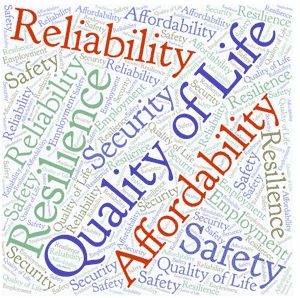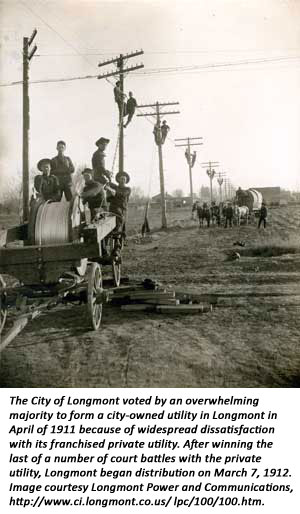
Many years ago (in 1932, to be exact) FDR made a comment in a speech in Portland, Oregon, about a major issue of the day: electrical service and who would provide it, public utilities or private companies. “My answer has been, as it is tonight, to point out these plain principles,” Roosevelt told the crowd. “That where a community—a city or county or a district—is not satisfied with the service rendered or the rates charged by the private utility, it has the undeniable basic right, as one of its functions of government, one of its functions of home rule, to set up … its own governmentally owned and operated service.” (Thanks to Alex Marshall for the reference.) Much has changed in what electrical service does and will do, and, as we are on the cusp of a new generation of what that means to a community, it’s worth reflecting on what FDR meant.
Service to the community is paramount—and when that directive is forgotten or changes, or a company loses focus on service, then it’s simply time for a change.

In the unending and often incomprehensible “he said-she said” back and forth opposing opinions of Boulder’s investigation of municipalization, the question keeps emerging: “Can we do better?” Often those who ask have never seen, let alone understood, what a utility does or should do. In its earliest years, the electrical industry’s most popular company names reflected FDR’s underlying point: the words “Public,” “Community,” and “Service” were central to the names of almost all these companies, and that drove the business rules of each company’s relationship with its customers.
It was not until the mid-1940s that the word “Power” became predominant, reflecting a shift to a very different stance with regard to the mission and end goal of a company that makes electricity. Today, we have major investor-owned utilities whose names are acronyms that do not even reflect their basic mandates, and it should not surprise anyone that these companies have also forgotten to consider their customers in the move to satisfy their investors.
All energy utilities, whether investor-owned (IOUs) or municipal, can be ranked into one of four efficiency categories with regard to their company-wide operations. Those rankings are directly tied to reliability of product and how they service their communities:
A = Excellent +/-
B = Good +/-
C = Average +/-
D = Poor +/-

The thing that should concern the business community and the citizens of Boulder is that the economic impact on community GDP improves by roughly 5% when the servicing company’s efficiency rating goes from D to C, 10% from C to B, and up to 20% from B to A. This is especially true as communication systems are now becoming bundled with energy systems. The published data from our current utility seems to show we are being served at either a C+ or C- level, with no real change in sight.
Two of our neighboring municipal utilities—Fort Collins and Longmont (who split from a private utility and built their own over 100 years ago)—are rated A- and B+, and have received national awards that attest to those rankings. Rather than rest on their laurels, both are engaged in planning efforts to improve their rankings even more over the next ten years. Sustainable energy sourcing and green initiatives are great things, but unless the reliability index of our energy is adequate to support our economy, it will not matter a hill of beans where we get our power from or from what source.
In many ways, the debate about sustainable sources is distracting from what should be our main focus. Future energy demand in the electronic age is about reliable stable, pure, not wildly oscillating energy, probably including smart DC that today is well understood but not widely implemented. Our current utility does not even seem to be addressing the nature and extent of that future demand. In fact, the company lobbied hard to ensure that regulation and code prevent the owners of solar systems from using the DC power they produce.
So a university, for example, that has solar panels on the roof of its computer laboratory cannot use the clean, steady DC power those panels produce to power the computers. It must send the output of the panels to the utility, which converts it to AC and redistributes it through the AC grid. In the computer lab under that bank of solar panels, the owner of the panels draws on the utility’s AC power. AC power naturally fluctuates and is subject to voltage sags and surges—up to 10% in either direction is not considered abnormal. Electronic devices, however, use DC power, and can easily be destroyed if they receive the wrong voltage. So the lab must be equipped with power conditioners to even out the voltage sags and surges and inverters to convert the AC power back to the DC used by computers. Or, of course, it can simply budget to replace a certain percentage of its equipment on an ongoing basis as it is damaged or destroyed by power fluctuations.
One of the prime problems for all our major companies, government facilities, and universities is dealing with the non-recoverable costs of either remediating or preventing damage to sensitive electronic equipment caused by today’s antiquated AC systems. In a recent survey less, that 20% of the current transmission hardware in Boulder was deemed to be in compliant with current code, and those of you with huge equity in your homes or businesses should look at the spaghetti wires outside them or the underground transmission bombs around them and wonder about that.
In my business (40 years expert process improvement and best practices work with utilities worldwide), we deal with major IOUs, including the local one. The teams on the ground, the people who are in daily contact with their customers, are clamoring to support the Boulder municipalization project’s drive to implement best practices and do it better; opposition is really a hold-over policy that was put in place under the retired CEO.
So let’s ponder FDR’s points again: “That where a community—a city or county or a district—is not satisfied with the service rendered or the rates charged by the private utility, it has the undeniable basic right, as one of its functions of government, one of its functions of home rule, to set up … its own governmentally owned and operated service.”
He never said what would happen if that private utility decided to sue to obstruct the initiative in order to retain its ability to continue to deliver poor service levels, but I think the answer is self-evident.
